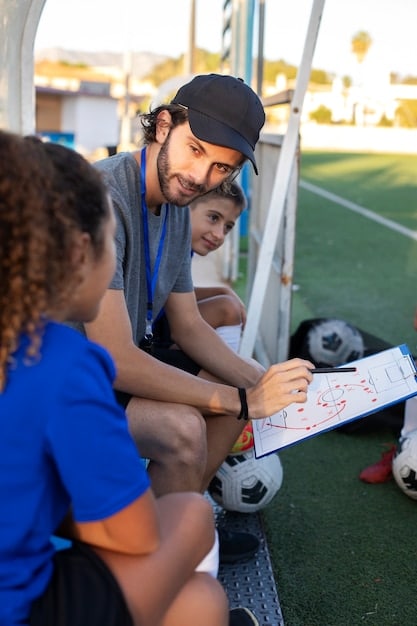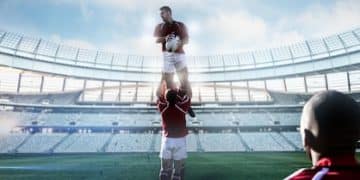La Liga’s 2025 Rule Changes: How They’ll Reshape Game Strategy

How La Liga’s Rule Changes Could Affect Game Strategy in the 2025 Season involves significant adjustments that could revolutionize team tactics, player roles, and overall match dynamics by emphasizing fair play, efficiency, and player well-being.
Get ready for a new era in Spanish football! The upcoming 2025 season of La Liga promises to bring exciting changes to the beautiful game. But how La Liga’s Rule Changes Could Affect Game Strategy in the 2025 Season? Prepare to have your strategies reshaped.
Understanding the Impending Rule Modifications
La Liga is set to introduce a series of rule changes aimed at improving the flow of the game, promoting fair play, and enhancing the overall viewing experience. These modifications will impact various aspects of the game, from player conduct to tactical approaches.
Key Rule Changes to Anticipate
Several potential rule changes are under discussion, each with the potential to significantly alter the dynamics of La Liga matches. Staying informed about these changes is essential for understanding how they might influence team strategies.
- Stricter Enforcement of Time Wasting: Referees may be instructed to more rigorously penalize players and teams who deliberately waste time, potentially leading to longer added time periods.
- Adjustments to Substitution Rules: Changes to the number or timing of substitutions could allow teams to introduce fresh players at strategic moments, shifting the momentum of a match.
- Video Assistant Referee (VAR) Enhancements: Refinements to the VAR system could lead to faster and more accurate decisions, reducing controversies and ensuring fairer outcomes.

These changes could lead to a more fluid and engaging style of play, with teams focusing on maintaining momentum and avoiding unnecessary delays. Coaches will need to adapt their strategies to account for these new realities.
The Impact on Tactical Formations
Tactical formations are the backbone of any successful football team. With the introduction of new rules, teams will need to re-evaluate their formations and consider how to best utilize their players to gain a competitive edge.
Adapting to Faster Gameplay
If the rule changes result in faster gameplay, teams may opt for more dynamic and flexible formations that allow for quick transitions between attack and defense. This could mean a shift away from rigid structures towards more fluid and adaptable systems.
- Emphasis on Versatile Players: Players who can seamlessly transition between multiple positions will become increasingly valuable.
- Fluid Midfield Structures: Midfield formations that allow for quick ball movement and creative passing will be essential.
- Attacking Flexibility: Strikers and wingers will need to be able to interchange positions to create confusion and exploit defensive weaknesses.
Coaches will need to experiment with different formations to find the right balance between defensive stability and attacking threat. The ability to adapt formations mid-game will also be crucial.
Player Roles and Responsibilities
The roles and responsibilities of players on the pitch are likely to evolve as a result of the new rule changes. Players will need to be more adaptable, versatile, and disciplined to succeed in the changing landscape.

The Rise of the Versatile Player
Players who can play multiple positions effectively will become highly sought after. These players will be able to fill in gaps caused by injuries or tactical adjustments, providing coaches with greater flexibility.
- Full-Backs as Playmakers: Full-backs who can contribute to both defense and attack will be essential for creating width and providing crosses into the box.
- Central Midfielders as Box-to-Box Threats: Central midfielders who can win tackles, distribute the ball, and make late runs into the box will be highly valued.
- Wingers as Inside Forwards: Wingers who can cut inside and score goals, as well as provide crosses, will be a constant threat to opposing defenses.
Players will also need to be more disciplined in their defensive duties, as any lapse in concentration could be costly under the new rules.
Training and Preparation Adjustments
To prepare for the new season, La Liga teams will need to adjust their training and preparation methods. This will involve a greater emphasis on fitness, tactical awareness, and mental resilience.
Focusing on Physical Conditioning
With the potential for increased game intensity, teams will need to prioritize physical conditioning. This will involve high-intensity interval training (HIIT), strength training, and endurance work.
Coaches will also need to monitor player fatigue levels carefully, as injuries could become more prevalent with increased game intensity. Rotation policies will be essential to keep players fresh and prevent burnout.
Enhancing Tactical Awareness
Players will need to be more tactically aware to adapt to the changing dynamics of the game. This will involve extensive video analysis, tactical drills, and game simulations.
Coaches will need to communicate their tactical vision clearly and ensure that players understand their roles and responsibilities within the team. The ability to make quick decisions under pressure will be crucial.
Scouting and Recruitment Strategies
The new rule changes are likely to influence scouting and recruitment strategies in La Liga. Teams will be looking for players who possess the qualities needed to thrive in the changing landscape.
Identifying Versatile Talents
Scouts will be tasked with identifying young players who possess the versatility and adaptability to play multiple positions effectively. This will involve attending youth tournaments, analyzing video footage, and conducting thorough background checks.
Teams may also look to recruit experienced players who have a proven track record of adapting to different tactical systems. These players can provide valuable leadership and help younger players develop.
Prioritizing Physical Attributes
Physical attributes such as speed, agility, and stamina will be highly valued. Teams may look to recruit athletes from other sports who possess these qualities and can be converted into successful footballers.
Medical staff will also play a crucial role in evaluating the physical condition of potential recruits, as teams will want to avoid signing players who are prone to injuries.
The Psychological Impact on Players
The psychological impact of the new rule changes on players should not be underestimated. Players will need to be mentally resilient and adaptable to cope with the changing demands of the game.
Dealing with Increased Pressure
The potential for increased game intensity and scrutiny could put added pressure on players. Teams will need to provide psychological support to help players manage stress and maintain their focus.
Coaches will also need to create a positive and supportive team environment, where players feel comfortable taking risks and making mistakes. Open communication and honest feedback will be essential.
Embracing Change
Players will need to embrace change and be willing to adapt their playing style to the new rules. This will involve a willingness to learn new skills, experiment with different positions, and take on new responsibilities.
Players who are resistant to change may struggle to adapt to the new environment, while those who embrace it will be more likely to thrive.
Fan Engagement and Viewing Experience
The new rule changes are also likely to have an impact on fan engagement and the overall viewing experience. The aim is to make the game more exciting, entertaining, and accessible to fans.
Increased Excitement and Drama
The potential for faster gameplay, more goals, and fewer stoppages could lead to increased excitement and drama. Fans may be more engaged and invested in the outcome of matches.
The use of VAR technology could also add to the sense of drama, as fans await the outcome of crucial decisions that could impact the result of the game.
Improved Accessibility
La Liga may look to improve the accessibility of the game to fans around the world. This could involve streaming matches online, providing real-time statistics and analysis, and engaging with fans on social media.
The aim is to create a sense of community and bring fans closer to the action, regardless of their location.
| Key Point | Brief Description |
|---|---|
| ⚽ Rule Adaptations | Teams need strategies for stricter time-wasting rules. |
| 🔄 Tactical Shifts | Dynamic and adaptable formations will be crucial. |
| 💪 Player Versatility | Versatile players who can adapt to different roles are valuable. |
| 🧠 Psychological Impact | Teams need to support players to handle pressure and changes. |
<
FAQ
▼
The primary adjustments involve stricter enforcement against time-wasting, modifications to substitution rules, and enhancements to the Video Assistant Referee (VAR) system for quicker, more accurate decisions.
▼
Teams may shift to more dynamic, fluid formations, emphasizing versatile players capable of quick transitions between attack and defense. Tactical flexibility during matches becomes more critical.
▼
Versatility, adaptability, and physical fitness will be highly prized. Players effective in multiple positions and capable of rapid transitions will gain significant importance.
▼
Training will intensify, focusing on endurance, tactical awareness, and quick decision-making under pressure. Monitoring player fatigue and implementing rotation to prevent burnout are essential.
▼
To boost engagement, La Liga can increase the game’s accessibility, provide real-time stats, and actively engage fans on social media, fostering a sense of community and excitement.
Conclusion
As La Liga prepares to introduce these rule changes for the 2025 season, it’s clear that teams will need to be proactive in adapting their strategies, player roles, and training methods. The emphasis on fair play, efficiency, and player well-being could lead to a more exciting and engaging game for players and fans alike.





